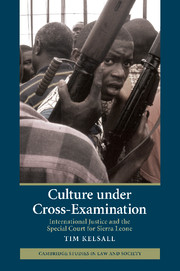Book contents
- Frontmatter
- Contents
- List of illustrations
- Preface
- 1 White man's justice? Sierra Leone and the expanding project of international law
- 2 The story of the CDF trial
- 3 An unconventional army: chains of command in a patrimonial society
- 4 Facts, metaphysics and mysticism: magical powers and the law
- 5 We cannot accept any cultural consideration: the child soldiers charge
- 6 ‘He's not very forthright’: finding the facts in a culture of secrecy
- 7 Cultural issues in the RUF, AFRC and Charles Taylor trials
- 8 Conclusion: from legal imperialism to dialogics
- References
- Index
4 - Facts, metaphysics and mysticism: magical powers and the law
Published online by Cambridge University Press: 18 January 2010
- Frontmatter
- Contents
- List of illustrations
- Preface
- 1 White man's justice? Sierra Leone and the expanding project of international law
- 2 The story of the CDF trial
- 3 An unconventional army: chains of command in a patrimonial society
- 4 Facts, metaphysics and mysticism: magical powers and the law
- 5 We cannot accept any cultural consideration: the child soldiers charge
- 6 ‘He's not very forthright’: finding the facts in a culture of secrecy
- 7 Cultural issues in the RUF, AFRC and Charles Taylor trials
- 8 Conclusion: from legal imperialism to dialogics
- References
- Index
Summary
One of the most extraordinary dimensions of the CDF trial, an aspect that made it unique in the history of international justice, was the section that dealt with supernatural forces. To be more precise, the Trial Chamber heard a considerable volume of evidence about ritual ceremonies in which CDF initiates were reportedly rendered immune to bullets by either consuming or applying occult medicines. Bullet-proofing was central to the theories of criminal conspiracy and superior responsibility advanced by the prosecution, and also to the overall strategy of the defence. In this chapter I provide some anthropological background to the use of magic and the occult in Sierra Leone, I discuss how colonial and post-colonial courts in Africa have dealt with magical phenomena, and then I examine evidence of the supernatural at trial. Ultimately, the bench acquitted Allieu Kondewa for crimes related to his mystical powers, but in this chapter I will argue from my anthropolitical perspective that their reasoning deserves a rethink.
MAGIC AND THE OCCULT IN SIERRA LEONE
Most people in the West, and certainly most international lawyers, believe that the world we live in is a largely secular domain governed by the actions of men and the scientific relations of mechanical cause and effect. God, if he exists at all, is assumed to be a rather distant presence, rarely revealing himself to humans and intervening only nebulously in day-to-day affairs; the same goes for other supernatural beings, such as angels, the devil or the deceased. According to this worldview, heaven and earth are distinct spheres that rarely intercalate.
- Type
- Chapter
- Information
- Culture under Cross-ExaminationInternational Justice and the Special Court for Sierra Leone, pp. 105 - 145Publisher: Cambridge University PressPrint publication year: 2009



